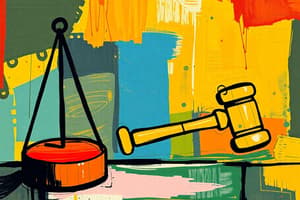Podcast
Questions and Answers
A third person may pledge his property to secure another person’s debt.
A third person may pledge his property to secure another person’s debt.
True (A)
The debtor or pledgor may alienate the thing pledged without the consent of the pledgee.
The debtor or pledgor may alienate the thing pledged without the consent of the pledgee.
False (B)
The pledgee may use the thing pledged even without the consent of the pledger if the use of the thing is necessary for its preservation.
The pledgee may use the thing pledged even without the consent of the pledger if the use of the thing is necessary for its preservation.
True (A)
A real mortgage is not binding between the parties if the same was entered into orally.
A real mortgage is not binding between the parties if the same was entered into orally.
Immovables may be the object of a deposit.
Immovables may be the object of a deposit.
What can C do if D cannot pay the loan at maturity?
What can C do if D cannot pay the loan at maturity?
What happens to the P20,000 debt and the pledge when D defaults on the loan and the ring is sold for P18,000 at auction?
What happens to the P20,000 debt and the pledge when D defaults on the loan and the ring is sold for P18,000 at auction?
If John pays P150,000 towards the P450,000 loan from Andrew, will the mortgage on John's share of the land be extinguished?
If John pays P150,000 towards the P450,000 loan from Andrew, will the mortgage on John's share of the land be extinguished?
What is the minimum amount that C can recover from D if D cannot pay the P100,000 loan at maturity?
What is the minimum amount that C can recover from D if D cannot pay the P100,000 loan at maturity?
What is the maximum amount that C can recover from D if D cannot pay the P20,000 loan and the ring is sold for P18,000 at auction?
What is the maximum amount that C can recover from D if D cannot pay the P20,000 loan and the ring is sold for P18,000 at auction?
If John, James, and Peter borrowed P450,000 from Andrew and mortgaged their undivided agricultural land, and John later pays P150,000, will the mortgage on John's share of the land be extinguished?
If John, James, and Peter borrowed P450,000 from Andrew and mortgaged their undivided agricultural land, and John later pays P150,000, will the mortgage on John's share of the land be extinguished?
If D pays X the entire $10,000 share, what is true regarding the pledge?
If D pays X the entire $10,000 share, what is true regarding the pledge?
What is the purpose of D endorsing the $12,000 promissory note to C?
What is the purpose of D endorsing the $12,000 promissory note to C?
On April 25, when M's promissory note is due, what can C do?
On April 25, when M's promissory note is due, what can C do?
If D repays the entire $10,000 loan before May 1, what happens to the pledged promissory note?
If D repays the entire $10,000 loan before May 1, what happens to the pledged promissory note?
What rights does C have over the pledged promissory note before its maturity date?
What rights does C have over the pledged promissory note before its maturity date?
If D defaults on the $10,000 loan, what must C do before foreclosing on the pledged note?
If D defaults on the $10,000 loan, what must C do before foreclosing on the pledged note?
Flashcards are hidden until you start studying
Study Notes
Pledges and Mortgages
- A third person can pledge their property to secure another person's debt.
- The pledgor (person who owns the pledged property) may not alienate the pledged thing without the consent of the pledgee (creditor).
- The pledgee may use the pledged thing if necessary for its preservation, but must do so with care and return it in its original state.
Pledge of Multiple Items
- If multiple items are pledged to secure a debt, and one of the items is used to settle part of the debt, the pledge of that item is extinguished.
- The pledgee cannot demand the return of all pledged items if only part of the debt has been paid.
Mortgages
- A real mortgage is binding between parties even if it was entered into orally.
- Immovables can be the object of a deposit.
Foreclosure of Mortgage
- If a mortgage is foreclosed and the property is sold for less than the debt, the creditor can recover the deficiency from the debtor.
- The creditor cannot recover the deficiency from a third party who owned the property.
Partial Payment and Mortgage
- If there are multiple debtors and one of them pays their share of the debt, the mortgage on their share of the property is not extinguished until the entire debt is paid.
- Payment by one debtor does not extinguish the mortgage on the property, as the obligation is solidary.
Studying That Suits You
Use AI to generate personalized quizzes and flashcards to suit your learning preferences.





